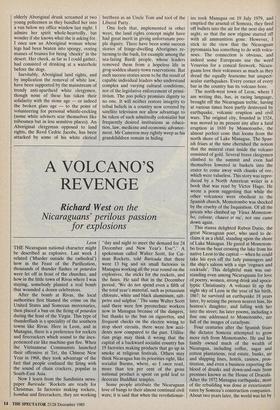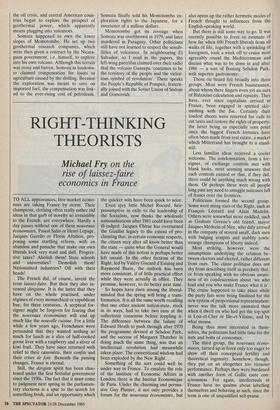A VOLCANO'S REVENGE
Richard West on the Nicaraguans' perilous passion for explosions Leon THE Nicaraguan national character might be described as explosive. Last week I related (`Murder outside the cathedral') how in the Feast of the Purification, thousands of thunder flashes or petardos were let off in front of the churches, and how in the little town of Rivas where I was staying, somebody planted a real bomb that wounded a dozen celebrators.
After the bomb at Rivas, the local authorities first blamed the crime on the United States and Somozan mercenaries, then placed a ban on the firing of petardos during the feast of the Virgin. This type of thunderflash is a speciality of the southern towns like Rivas. Here in Leon, and in Managua, there is a preference for rockets and firecrackers which sound to the inex- perienced ear like machine-gun fire. When the Vietnamese Communists launched their offensive at Tet, the Chinese New Year in 1968, they took advantage of the fact that people confused the firing with the sound of chain crackers, popular in South-East Asia.
Now I learn from the Sandinista news- paper Baricada: 'Rockets are ready for Christmas. In factories making rockets, bombas and firecrackers, they are working "day and night to meet the demand for 24 December and New Year's Eve".' A spokesman called Walter Scott, for Cai- man Rockets, told Baricada that there were 13 big and six small factories in Managua working all the year round on the explosives, the sticks for the rockets, and the fuses. He said that in the December period, 'We do not spend even a fifth of the total year's material, such as potassium chlorate, white and black aluminium, salt- petre and sulphur.' The same Walter Scott said there were few pyrotechnic workers now in Managua because of the dangers, but thanks to the ban on cigarettes, and frequent checks on the electric wiring to stop short circuits, there were few acci- dents now compared to the past. Utilita- rian prigs may think it wrong that the capital of a backward socialist country has 19 factories making products that go up in smoke at religious festivals. Others may think Nicaragua has its priorities right, like socialist Burma, where, so I once read, more than ten per cent of the gross national product is spent on gold leaf to decorate Buddhist temples.
Some people attribute the Nicaraguan love of bangs to their almost continual civil wars; it is said that when the revolutionar- ies took Managua on 19 July 1979, and emptied the arsenal of Somoza, they fired off bullets into the air for the next day and night, so that the new regime started off with all ammunition gone. However, I stick to the view that the Nicaraguan pyromania has something to do with volca- noes. The connection is obvious, and indeed some Europeans use the word Vesuvius for a conical firework. Nicara- guans love their volcanoes as much as they dread the equally fearsome but unspect- acular earthquakes. Every corner of every bar in the country has its volcano bore.
The north-west town of Leon, where I am writing this, has, in racing language, brought off the Nicaraguan treble, having at various times been partly destroyed by earthquake, volcanic eruption and civil wars. The original city, founded in 1524, was moved to its present site after a fatal eruption in 1610 by Momotombo, the almost perfect cone that looms from the north shore of Lake Managua. The Span- ish friars at the time cherished the notion that the mineral crust inside the volcano consisted of gold. Several brave clergymen climbed to the summit and even had themselves lowered in baskets into the crater to come away with chunks of ore, which were valueless. This story was repro- duced by a North American writer in a book that was read by Victor Hugo. He wrote a poem suggesting that while the other volcanoes were obedient to the Spanish church, Momotombo was shocked by the cruelty of the Inquisition. Of all the priests who climbed up 'Vieux Momotom- bo, colosse, chauve et nu', not one came down again.
This stanza delighted Ruben Dario, the great Nicaraguan poet, who used to de- claim it as a child, standing upon the shore of Lake Managua. He gazed at Momotom- bo from the boat crossing the lake from his native Leon to the capital — when he could take his eyes off the lady passengers and the ship's saloon with a sign 'cognacs and cocktails'. This delightful man was out- standing even among Nicaraguans for love of poetry, women, strong drink and apoca- lyptic Christianity. A volcano lit up the night sky of Leon in the year of his birth, 1867; he survived an earthquake 18 years later, by seizing the person nearest him, his hostess's daughter, and falling with her into the street; his later poems, including a fine one addressed to Momotombo, are full of the images of cataclysm.
Four centuries after the Spanish friars the dictator Somoza attempted to grow more rich from Momotombo. He and his family owned much of the wealth of Nicaragua, including coffee, sugar and cotton plantations, real estate, banks, air and shipping lines, hotels, casinos, pros- titution, and even a business exporting the blood of drunks and down-and-outs from premises known as the House of Dracula. After the 1972 Managua earthquake, most of the rebuilding was done at extortionate rates by Somoza's construction companies. About two years later, the world was hit by the oil crisis, and central American coun- tries began to explore the prospect of geothermal power, which apparently means plugging into volcanoes.
Somoza happened to own the lower slopes of Momotombo. He set up two geothermal research companies, which were then given a contract by the Nicara- guan government, i.e. himself, to explore into his own volcano. Although this terrain was stony and barren, Somoza as landown- er claimed compensation for losses to agriculture caused by the drilling. Because the exploration was meant to save on imported fuel, the compensation was link- ed to the ever-rising cost of petroleum. Somoza finally sold his Momotombo ex- ploration rights to the Japanese, for a sweetener of a million dollars.
Momotombo got its revenge when Somoza was overthrown in 1979, and later murdered in Paraguay. Other politicians still have not learned to respect the sensib- ilities of volcanoes. In neighbouring El Salvador, so I read in the papers, the left-wing guerrillas claimed over their radio that the volcano Guazepa 'continues to be the territory of the people and the victor- ious symbol of revolution'. There speaks the People's Republic of Pompeii, fratern- ally joined with the Soviet Union of Sodom and Gomorrah.



















































































 Previous page
Previous page